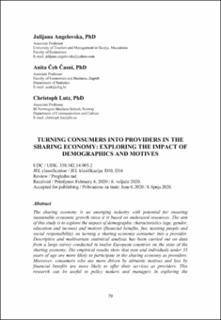Turning Consumers into Providers in the Sharing Economy: Exploring the Impact of Demographics and Motives
Peer reviewed, Journal article
Published version
Permanent lenke
https://hdl.handle.net/11250/2999658Utgivelsesdato
2020Metadata
Vis full innførselSamlinger
Originalversjon
Ekonomska Misao i Praksa. 2020, 2020 (1), 79-100.Sammendrag
The sharing economy is an emerging industry with potential for ensuring sustainable economic growth since it is based on underused resources. The aim of this study is to explore the impact of demographic characteristics (age, gender, education and income) and motives (financial benefits, fun, meeting people and social responsibility) on turning a sharing economy consumer into a provider. Descriptive and multivariate statistical analysis has been carried out on data from a large survey conducted in twelve European countries on the state of the sharing economy. The empirical results show that men and individuals under 35 years of age are more likely to participate in the sharing economy as providers. Moreover, consumers who are more driven by altruistic motives and less by financial benefits are more likely to offer their services as providers. This research can be useful to policy makers and managers in exploring the opportunities of supporting broader participation in offering services as providers in the sharing economy.
